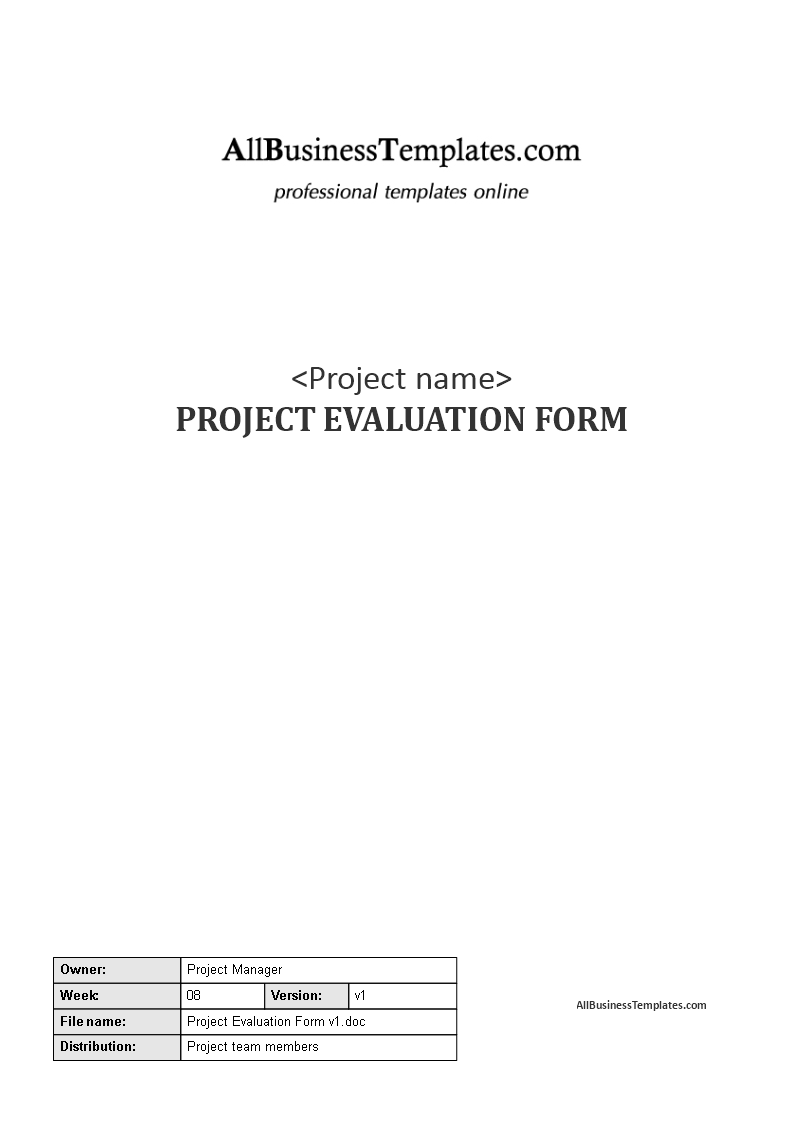Project Evaluation Form Template
Save, fill-In The Blanks, Print, Done!

Download Project Evaluation Form Template
Today: USD 4.99
Download It Now

Available premium file formats:
Microsoft Word (.doc)Other languages available:
- This Document Has Been Certified by a Professional
- 100% customizable
- This is a digital download (98.5 kB)
- Language: English
- You will receive a link to download the file as soon as your payment goes through.
- We recommend downloading this file onto your computer.
How does a project evaluation form work? Are you looking for an easy-to-use Project Evaluation Form template? Download our form template which is intuitive and perfect for quickly assessing any project or program. It can be customized easily, so you can use it for any project.
A Project Evaluation Form is a structured document or tool used to assess and analyze the performance, outcomes, and overall effectiveness of a specific project once it has been completed or has reached a significant milestone. The primary purpose of a Project Evaluation Form is to gather feedback and data to determine whether the project achieved its objectives, delivered its intended benefits, and identified areas for improvement in future projects. These forms can be used for internal review within an organization or shared with external stakeholders, such as funders or clients, to demonstrate accountability and transparency. Here are the key components typically included in a Project Evaluation Form:
- Project Information: This section provides basic project details, including the project name, description, start and end dates, and project manager or team leader.
- Objectives and Goals: Outline the project's original objectives and goals that were set at the beginning of the project. This section helps to provide context for the evaluation.
- Evaluation Criteria: Define the criteria and key performance indicators (KPIs) that will be used to evaluate the project's success. These criteria should be specific, measurable, and aligned with the project's objectives.
- Data Collection: Describe the methods and sources of data used to evaluate the project. This may include surveys, interviews, document reviews, or performance metrics.
- Data Analysis: Detail the process for analyzing the collected data, including any statistical methods or tools used. Explain how the data will be interpreted.
- Findings and Results: Present the findings of the evaluation, including both quantitative and qualitative data. Assess whether the project met its objectives and goals based on the evaluation criteria.
- Lessons Learned: Identify the key lessons learned during the project. This can include both successes and challenges encountered, as well as recommendations for improvement in future projects.
- Impact and Benefits: Discuss the project's impact on stakeholders and the organization. Highlight any tangible benefits achieved as a result of the project's completion.
- Recommendations: Based on the evaluation findings, provide recommendations for future projects or actions that can be taken to enhance project performance.
- Conclusions: Summarize the main conclusions drawn from the evaluation, including whether the project was successful and whether it delivered value.
- Action Plan: If there are identified areas for improvement or recommendations, outline an action plan for implementing changes or addressing issues in future projects.
- Stakeholder Feedback: Include any feedback or comments from project stakeholders, such as team members, clients, or funders, regarding their satisfaction with the project's outcomes and processes.
Project Evaluation Forms are valuable tools for continuous improvement and accountability. They help organizations assess the effectiveness of their project management processes and make informed decisions about future projects. By systematically gathering and analyzing data, organizations can identify strengths and weaknesses, make necessary adjustments, and enhance their project management practices over time.
We provide a professional Word Template suitable for Project Evaluations that are held between the Project Manager and the Project members or the Client. By using this Project Management Evaluation Form Template, you will be able to gain valuable future insights from lessons learned during the project. It also helps you to maximize the realization of opportunities for future projects. This step is very important and can also provide future business opportunities when new challenges during the project are found. By using a very professional project evaluation form like this, you will establish a good impression with all stakeholders involved, including the client, project members, boss, etc.
This Project Evaluation Form covers the following topics:
- Project goals
- Project results
- Timing
- Budget
- Quality
- Client Resources
- Methods & tools
- Implementation
- Sponsors
- Project Managers, and
- Project Team
Example questions that are raised, are:
- Have the project goals been clearly defined beforehand?
- Did the project contribute to the organizational or departmental goals?
- What project results and deliverables are obtained?
- Was the project planning realistic?
- During the course of eh project, were there enough checks on whether the planned end date was feasible?
- Has the expected quality of the end results been clearly defined beforehand?
- Was a planned deployment of (client) resources realistic as described in the SLAs?
- Has it been safeguarded that the Client will still use the end results of the project in the future?
- etc
Our free business and project management templates are all in use by project professionals and project officers. Download this professional project evaluation form now! Using our business templates guarantees you will save time, cost, and effort and helps you to reach the next level of success in your education, work, and business!
DISCLAIMER
Nothing on this site shall be considered legal advice and no attorney-client relationship is established.
Leave a Reply. If you have any questions or remarks, feel free to post them below.
Top Project Management Templates
Are you looking for effective project management templates to improve your project efficiency and effectiviness? These easy to amend project management templates can help you out!
Read moreRelated templates
Latest templates
Latest topics
- GDPR Compliance Templates
What do you need to become GDPR compliant? Are you looking for useful GDPR document templates to make you compliant? All these compliance documents will be available to download instantly... - Google Docs Templates
How to create documents in Google Docs? We provide Google Docs compatible template and these are the reasons why it's useful to work with Google Docs... - IT Security Standards Kit
What are IT Security Standards? Check out our collection of this newly updated IT Security Kit Standard templates, including policies, controls, processes, checklists, procedures and other documents. - Letter Format
How to format a letter? Here is a brief overview of common letter formats and templates in USA and UK and get inspirited immediately! - Google Sheets Templates
How to work with Google Sheets templates? Where to download useful Google Sheets templates? Check out our samples here.
cheese
